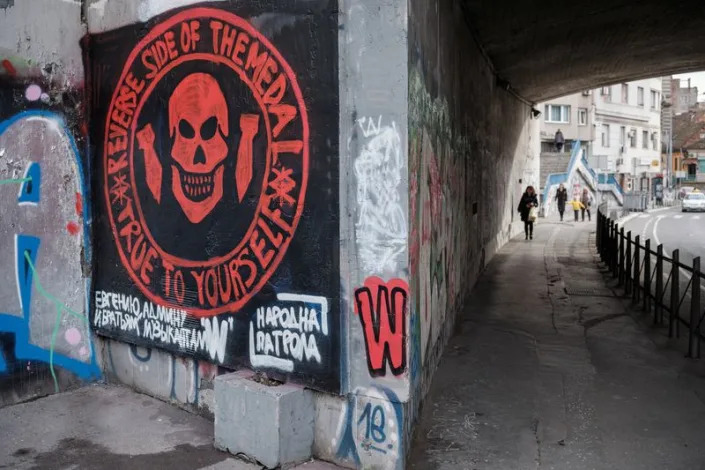Firing an anti-ship missile at a regular building is a chaotic strategy Russia may regret, expert says
Sophia Ankel
Fri, January 20, 2023

Rescuers use special equipment to rescue people from damaged apartments after a missile strike in Dnipro, Ukraine, on January 15, 2023.Yurii Stefanyak/Global Images Ukraine via Getty Images
Russia fired an anti-ship missile into an apartment complex in Dnipro, Ukraine, last weekend.
Its use is an illustration of Russia's "kitchen sink approach," a missile expert told Insider.
Moscow is using a mix of missiles to overwhelm the Ukrainian airspace, the expert added.
Russia blew up an apartment complex in central Ukraine last weekend, killing 40 people and injuring 80 more.
The strike was notable for its brutality, but also for the choice of weapon: an old, Soviet-style missile designed to demolish buildings but to sink aircraft carriers.
Yuriy Ihnat, a Ukrainian military spokesman, told local media that the strike used a Kh-22 anti-ship missile. The supersonic munitions have a 2,000-pound warhead, and are designed to destroy aircraft-carrier groups at sea, Ihnat said.
Russia denied responsibility for the attack, repeating its assertion that it only strikes military targets — despite months of evidence to the contrary.
The strike is a sign that Russia is resorting to a "kitchen-sink approach," said Ian Williams, deputy director of the Missile Defense Project at the Center for Strategic and International Studies, in a call with Insider.
"We're seeing everything at the moment, we're just seeing a blend, we're seeing newer missiles, older missiles ... they really just want to hit something," Williams said.
He said the Kh-22 missiles are "basically being used as terror weapons," totally removed from their actual military purpose.
The Russians are using all kinds of projectiles to "flood the Ukrainian air space with a lot of crap, kind of confusing the air defenses a little bit, and overwhelming them," Williams said.
Ukraine's air defense, bolstered by Western equipment, has so far been notably successful in blunting Russia's attacks, other experts previously told Insider. But it can't stop everything.
The attack in Dnipro was not the first time Russia used a Kh-22 in a civilian attack, and will most likely be the last, Williams said.
Short-term thinking
Williams said using an anti-ship missile like this betrayed a "short-term approach" by Russia, which is degrading its ability to fend off other threats.
He said the Kh-22 missile is among "some of best things [the Russians] have to fend off the US Navy or a NATO naval force, yet they're using them up hitting apartments and warehouses."
"It's very short-term thinking. It's almost like: 'Throw whatever we can at them right now in whatever mode you want, and we'll deal with it later,'" he said.
Here are the victims of Russia's brutal strike on apartment building in Dnipro
Daria Shulzhenko
Thu, January 19, 2023
A Russian missile killed 46 people after smashing straight into an apartment building in the city of Dnipro on Jan. 14.
It was one of the deadliest single Russian attacks on Ukraine and the deadliest one for Dnipro, a central Ukrainian city with a pre-war population of nearly 1 million.
The strike was part of Russia's recent massive attack across Ukraine that targeted multiple cities, including Kyiv, Odesa, Kharkiv, Vinnytsia, and Kryvyi Rih.
President Volodymyr Zelensky said about 1,700 people lived in the high-rise building that was hit; 230 apartments were damaged, and 72 were completely destroyed by Russia's Kh-22 missile, which is designed to destroy aircraft carriers
On Jan. 17, three days after the strike, the search and rescue operation was completed at the site. Among those 46 killed were six children. Eleven bodies are still unidentified as of Jan. 19, and 11 people are still missing, according to Dnipropetrovsk Oblast Governor Valentyn Reznichenko.
Here's what we know about the victims of Russia’s brutal strike.
Remembering the victims
The Kyiv Independent has previously reported about the family of Yevhen Frantsev, 61, whose 39-year-old daughter Oksana and his two granddaughters, Mykhailyna and Leila, aged three and 13, were killed by the attack.
They lived on the fifth floor of the building. Several days after the tragedy, Frantsev's son identified Oksana and her two children in the city's morgue.
Read the full story here: Hopes for a miracle die at Dnipro morgue, as relatives line up to identify victims of Russian attack.
Reporting from Dnipro, the Kyiv Independent has also spoken with a colleague of the killed father of Anastasiia Shvets, 23, whose photograph sitting on the ruins of the building went viral on social media.
Shvets survived the attack, but her parents were killed.
Another victim already reported by the Kyiv Independent was Mykhailo Kurenovskyi, a well-known local boxing coach who lived on the top floor of the apartment building.
Read the story here: Russian missile attack on Dnipro destroys families as death toll rises.
Among the other victims were two friends, dentists Iryna Salamatenko and Olha Usova.
A friend of Salamatenko, Alina Abgarian, confirmed the woman's death to the Kyiv Independent. Though she has known Salamatenko only for two years, she says she will remain in her heart forever.
"She was an incredible woman. I have never met such people," Abgarian said.
According to her, Salamatenko "loved her family and friends very much." "She loved life and was very afraid of missiles."
Salamatenko and Usova were walking past the building when the Russian missile hit it.
"This should not have happened," says Abgarian. "This was not the building in which she lived. This was not her workplace."
"She just happened to be (there) at the wrong moment," she adds.
Just three days before she was killed, Salamatenko celebrated her 39th birthday. According to Abgarian, Salamatenko is survived by her six-year-old daughter and her 14-year-old son.

Olha Usova (L) and Iryna Salamatenko. (Yuliia Dmytrova/Facebook)
A man who knew Usova, Andrii Biliak, wrote on Facebook that she was "an extremely kind woman, intelligent, sincere, who helped Ukraine's Armed Forces and everyone else as much as she could." She also had a little son and a husband, according to Biliak.
Their colleague, Artem Pohil, said Usova and Salamatenko were best friends and “will remain best friends forever.”
"This is difficult to understand,” Pohil wrote on Facebook. "The entire stomatological community of Ukraine will remember the doctors whose lives were taken away by (the Russian strike) just because they were Ukrainians."

Iryna Shevchuk and Maksym Shevchuk. (Tanya Mishurenko/Facebook)
The attack also killed Iryna Shevchuk and Maksym Shevchuk, a married couple who, six months ago, relocated to Dnipro from the city of Nikopol, which endures heavy shelling and is located not far from the occupied town of Enerhodar, the epicenter of Russian blackmail in Ukraine.
Valeriia Marchenko, Iryna's sister-in-law, told Ukrainian media outlet Ukrainska Pravda that the couple's two children, 14-year-old Karolina and nine-year-old Tymur, survived the attack. They have been hospitalized. Marchenko told journalists that Karolina's leg was broken, and Tymur's arm was injured.
"The children went outside and were waiting for their parents when the (Russian missile) flew right into their house," Marchenko wrote on Instagram.
She also wrote that their apartment was located on the eighth floor and that now, one could "easily see the color of the wallpaper in their living room" from outside.
In her latest post, Marchenko wrote that she "has no words to describe what their family is feeling."
"A terrible tragedy took the lives of two beautiful, loving parents," she wrote.
Two days after the attack, the city's department of humanitarian policy confirmed the death of two teenagers, 17-year-old Maksym Bohutskyi and 15-year-old Mariia Lebid.

Maksym Bohutskyi (Evgeny Gendin/Facebook)
Bohutskyi was a first-year student at the Dnipro University of Technology. The institution also confirmed his death on Jan. 16.
"Today, the hope of finding him alive has faded," the university wrote on Facebook.
"Maksym, forever a student, will be remembered as a bright, active, and intelligent person, our excellent student."
Supposedly a colleague of Maksym's mother, Tetiana Bohutska, wrote on Twitter that he was her only son.
The death of Mariia Lebid was reported by her relative, Alisа Fridman: "My 15-year-old, super-smart, super-talented, insanely funny sister-in-law is gone," Fridman wrote on Instagram.

Mariia Lebid. (Dance shcool Kaskad/Facebook)
Evgeniya Bondarenko, who knew the girl and her family, wrote on Facebook that Lebid was at home when the Russian missile hit the building "while her mother was at work and did not know what had happened."
According to Bondarenko, Lebid's brother Pavlo was the first one to arrive at the site of the tragedy, "but there was no home anymore."
"Our student, a very bright girl, was killed yesterday during a missile attack," wrote the dance school Lebid was attending.
The youngest victim of the vicious strike was one-year-old baby boy Mykyta Zelensky. His mother, 27-year-old Kateryna, was rescued from under the rubble some 20 hours after the attack happened, Ukrainska Pravda reported.
"She could not call for help because she has been deaf since childhood," Kateryna's sister, Alina, wrote on Instagram.
The family's hopes that rescuers would also find little Mykyta and his 28-year-old father, Oleksiy Zelensky, alive faded away three days after the deadly attack. On Jan. 17, their bodies were retrieved from under the rubble, reported Ukrainian media outlet Suspilne.

Kateryna Zelenska lost her husband Oleksiy Zelensky to the Russian missile strike on an apartment building in Dnipro on Jan. 14, 2023. (Kateryna Zelenska/Instagram)
Oleksiy's sister, Yelyzaveta, told Suspilne that the family lived on the fourth floor of the building. When she learned about the strike, Yelyzaveta immediately tried to reach her brother.
"We began to call Oleksiy, but he did not answer. Parents immediately went to the site. Then we realized that their apartment had been hit," Yelyzaveta said, as quoted by Suspilne.
"Oleksiy was found only today (Jan. 17), at about 1 p.m., as well as their one-year-old son Mykyta," she said.
"The rescuers saw their bodies yesterday but could not get to them because they were pressed by a slab."
Yelyzaveta also told Suspilne that Kateryna had been hospitalized and that there was no risk to her life, "but it is difficult for her psychologically."
"She lost both her husband and her child in one day," Yelyzaveta said.
Honoring the memory of those killed, Zelensky said that Ukraine “will find everyone involved in this terror.”
“Everyone will bear responsibility. Utmost responsibility,” he said.









